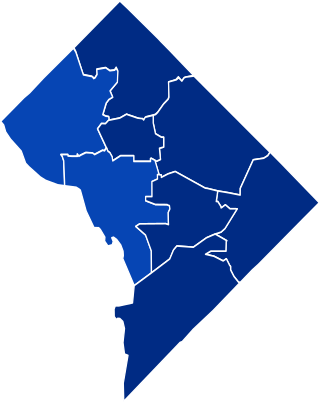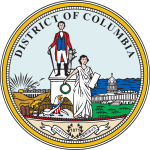
The District of Columbia's at-large congressional district is a congressional district based entirely of the District of Columbia. According to the U.S. Constitution, only states may be represented in the Congress of the United States. The District of Columbia is not a U.S. state and therefore has no voting representation. Instead, constituents in the district elect a non-voting delegate to the U.S. House of Representatives.

Walter Edward Fauntroy is an American pastor, civil rights activist, and politician who was a delegate to the United States House of Representatives and a candidate for the 1972 and 1976 Democratic presidential nominations as a favorite son.
Non-voting members of the United States House of Representatives are representatives of their territory in the House of Representatives, who do not have a right to vote on proposed legislation in the full House but nevertheless have floor privileges and are able to participate in certain other House functions. Non-voting members may vote in a House committee of which they are a member and introduce legislation.

The 1972 United States House of Representatives elections coincided with the landslide reelection victory of President Richard M. Nixon. Nixon's Republican Party managed to gain a net of twelve House of Representatives seats from the Democratic Party, although the Democrats retained a majority.

On November 6, 1990, the District of Columbia held an election for its non-voting House delegate representing the District of Columbia's at-large congressional district. Incumbent Walter E. Fauntroy (D) had stepped down earlier to run for Mayor of Washington, D.C. Eleanor Holmes Norton (D) won the open seat. All elected members would serve in 102nd United States Congress.

On November 2, 2002, the District of Columbia held an election for its non-voting House delegate representing the District of Columbia's at-large congressional district. The winner of the race was incumbent Eleanor Holmes Norton (D).

On November 2, 2000, the District of Columbia held an election for its non-voting House delegate representing the District of Columbia's at-large congressional district. The winner of the race was incumbent Eleanor Holmes Norton (D).

On March 23, 1971, the District of Columbia held a special election for its non-voting House delegate representing the District of Columbia's at-large congressional district. This was the first election for the newly re-created district since Norton P. Chipman briefly held the seat during the Reconstruction Era. The winner of the race was Walter E. Fauntroy, a Democrat. After serving his remaining term in the 92nd United States Congress, he would continue to be re-elected until he stepped down to run for mayor in the 1990 election.

On November 4, 1974, the District of Columbia held an election for its non-voting House delegate representing the District of Columbia's at-large congressional district. The winner of the race was Walter E. Fauntroy (D), who won his second re-election. Independent candidate James G. Banks surprised many by taking second place, ahead of William R. Phillips (R) and D.C. Statehood Party candidate Anton V. Wood. All elected members would serve in 94th United States Congress.

On November 2, 1976, the District of Columbia held an election for its non-voting House delegate representing the District of Columbia's at-large congressional district. The winner of the race was Walter E. Fauntroy (D), who won his third re-election. The election was notable for having a record-low turnout, as less than 16,000 voters cast their ballot in this election. This was the lowest recorded turnout for an election to this office. All elected members would serve in 95th United States Congress.

On November 7, 1978, the District of Columbia held an election for its non-voting House delegate representing the District of Columbia's at-large congressional district. The winner of the race was Walter E. Fauntroy (D), who won his fourth re-election. All elected members would serve in 96th United States Congress.

On November 4, 1980, the District of Columbia held an election for its non-voting House delegate representing the District of Columbia's at-large congressional district. The winner of the race was Walter E. Fauntroy (D), who won his fifth re-election. All elected members would serve in 97th United States Congress.

On November 2, 1982, the District of Columbia held an election for its non-voting House delegate representing the District of Columbia's at-large congressional district. The winner of the race was Walter E. Fauntroy (D), who won his sixth re-election. All elected members would serve in 98th United States Congress.

On November 6, 1984, the District of Columbia held an election for its non-voting House delegate representing the District of Columbia's at-large congressional district. The winner of the race was Walter E. Fauntroy (D), who won his seventh re-election. All elected members would serve in 99th United States Congress.

On November 4, 1986, the District of Columbia held an election for its non-voting House delegate representing the District of Columbia's at-large congressional district. The winner of the race was Walter E. Fauntroy (D), who won his eighth re-election. All elected members would serve in 100th United States Congress.

On November 8, 1988, the District of Columbia held an election for its non-voting House delegate representing the District of Columbia's at-large congressional district. The winner of the race was Walter E. Fauntroy (D), who won his ninth re-election. All elected members would serve in 101st United States Congress.

On November 3, 1992, the District of Columbia held an election for its non-voting House delegate representing the District of Columbia's at-large congressional district. The winner of the race was Eleanor Holmes Norton (D), who won her first re-election. All elected members would serve in 103rd United States Congress.

On November 8, 1994, the District of Columbia held an election for its non-voting House delegate representing the District of Columbia's at-large congressional district. The winner of the race was Eleanor Holmes Norton (D), who won her second re-election. All elected members would serve in 104th United States Congress.

On November 5, 1996, the District of Columbia held an election for its non-voting House delegate representing the District of Columbia's at-large congressional district. The winner of the race was Eleanor Holmes Norton (D), who won her third re-election. All elected members would serve in 105th United States Congress.

On November 3, 1998, the District of Columbia held an election for its non-voting House delegate representing the District of Columbia's at-large congressional district. The winner of the race was Eleanor Holmes Norton (D), who won her fourth re-election. All elected members would serve in 106th United States Congress.








